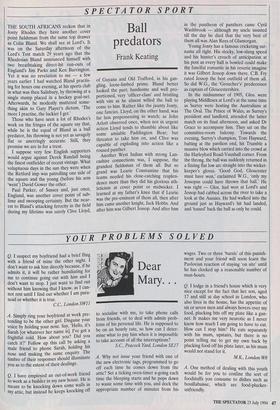SPECTATOR SPORT
Ball predators
Frank Keating
THE SOUTH AFRICANS reckon that in Jonty Rhodes they have another cover point fieldsman from the same top drawer as Colin Bland. We shall see at Lord's. It was on the Saturday afternoon of the Lord's Test match 29 years ago that the Rhodesian Bland announced himself with two breathtaking direct-hit run-outs of England's Jim Parks and Ken Barrington. Yet it was no revelation to me — a few years earlier I had watched Bland practis- mg for hours one evening, at his sports club in what was then Salisbury, by throwing at a single stump placed in a hockey goal-net. Afterwards, he modestly muttered some- thing akin to Gary Player's dictum, 'The more I practise, the luckier I get.' Those who have seen a lot of Rhodes's work on the fringes of the square say that, while he is the equal of Bland as a ball predator, his throwing is not yet as savagely flat or unerringly accurate. Still, they promise we are in for a treat. I suppose very few English supporters would argue against Derek Randall being the finest outfielder of recent vintage. What voluptuous days in the sun they were when the Retford imp was patrolling one side of the square and the young (before his arm 'went') David Gower the other. Paul Parker, of Sussex and, just once, England, was another cover point of sub- lime and swooping certainty. But the near- est to Bland's attacking ferocity in the field during my lifetime was surely Clive Lloyd, of Guyana and Old Trafford, in his gan- gling, loose-limbed prime. Bland better looked the part; handsome and well pro- portioned, very 'officer-class' and bristling with vim as he almost willed the ball to come to him. Rather like the jaunty Jonty, one fancies. Lloyd, on the other hand, was far less prepossessing to watch; as John Arlott observed once, when not in urgent action Lloyd tends to shamble about like some amiable Paddington Bear; but threaten to take him on, and Clive was capable of exploding into action like a roused panther. Another West Indian with strong Lan- cashire connections was, I suppose, the grandest fieldsman of them all. But so grand was Learie Constantine that his teams needed his close-catching resplen- dence more than they did his glorious ath- leticism at cover point or midwicket. I learned at my father's knee that if Learie was the pre-eminent of them all, then after him came another knight, Jack Hobbs. And after him was Gilbert Jessop. And after him in the pantheon of panthers came Cyril Washbrook — although my uncle insisted till the day he died that the very best of them all was Alan Rees of Glamorgan. Young Jonty has a famous cricketing sur- name all right. His stocky, low-slung speed and his hunter's crouch of anticipation at his post as every ball is bowled could make the fanciful romantic in his reverie imagine it was Gilbert Jessop down there. C.B. Fry rated Jessop the best outfield of them all. So did W.G., the `Groucher's' predecessor as captain of Gloucestershire.
In the midsummer of 1905, Glos. were playing Middlesex at Lord's at the same time as Surrey were hosting the Australians at The Oval. The Prince of Wales, as Surrey's president and landlord, attended the latter match on its final afternoon, and asked Dr Grace to accompany him. They sat on the committee-room balcony. Towards the evening, Surrey's champion, Tom Hayward, batting at the pavilion end, hit Trumble a massive blow which carried into the crowd at the Harleyford Road-Vauxhall corner. From the throng, the ball was suddenly returned in a fizzing flat low arc straight into the wicket- keeper's gloves. 'Good God, Gloucester must have won,' exclaimed W.G., 'only my Jessopus could have thrown that ball.' He was right — Glos. had won at Lord's and Jessop had cabbed across the river to take a look at the Aussies. He had walked into the ground just as Hayward's hit had landed, and `tossed' back the ball as only he could.


















































 Previous page
Previous page